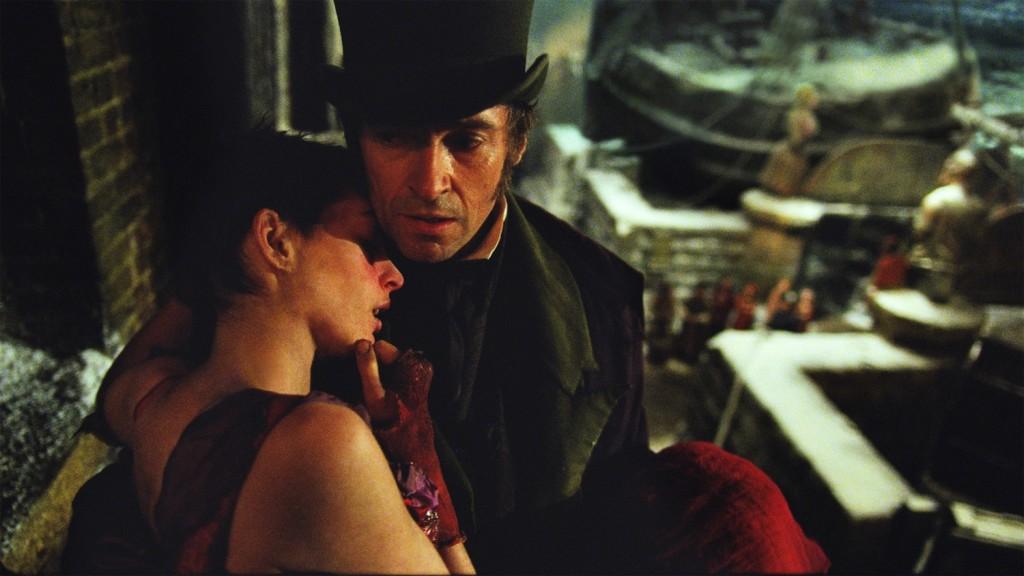Review: Les Mis delivers splendid rendition of musical – 4/5 stars
January 3, 2013
The movie Les Miserables brings the popular musical and classical novel to life on the silver screen with its soaring score, grand scenery, and talented cast of A-list actors.
The backbone of the story focuses on Jean Valjean (Hugh Jackman), an ex-convict who is on the run from policeman Javert (Russell Crowe). In his quest to rise above his past, Valjean encounters Fantine (Anne Hathaway), a young woman who is struggling to provide for her daughter Cosette (Amanda Seyfried). Valjean becomes a fatherly figure to Cosette, and they travel to Paris during the beginning of a student revolution led by Enjolras (Aaron Tveit) and Marius (Eddie Redmayne). Marius and Cosette spark a budding romance; however, the immediate danger of the revolution endangers their relationship.
The predictable plot and overwhelming sentimentality become slightly cloying throughout the film. Fortunately, much needed comic relief by the thieving Thenardiers (Helena Bonham Carter and Sacha Baron Cohen) as well as impressive acting of the cast save the movie from drowning in tragic melodramatics.
Additionally, the choices made in filming the movie and designing the set add a new layer of meaning to the storyline. Some scenes are paralleled, allowing viewers to see the changes in each character over the course of the movie. For example, Javert soliloquizing while pacing the edge of the wall in both the church and the edge of the bridge are both shot the same way, with the camera panning towards his feet. The first scene shows him firmly swearing to hunt down Valjean, while the next one depicts him questioning the law and his own character moments before his suicide.
While the acting in Les Miserables is excellent, controversy surrounds the quality of music presented. Director Tom Hooper takes a significant risk by having the actors sing live on set rather than record in advance. From the stirring anthem of the revolution “Do You Hear the People Sing” to the ballad “I Dreamed A Dream,” each actor recorded at the filming site with a piano accompanist who followed the specific tempo the actor chose. An orchestra later replaces the piano, but the music still does not match up well with the singing part. Although the decision made the end result imperfect, it gave the actors the freedom to blend their acting and singing, resulting in a breathtaking film score that harnesses the raw emotion of the story.
Les Miserables undoubtedly lives up to its spectacular renditions both on paper and on the stage with its powerful performance and delivery.


















![“[Building nerf blasters] became this outlet of creativity for me that hasn't been matched by anything else. The process [of] making a build complete to your desire is such a painstakingly difficult process, but I've had to learn from [the skills needed from] soldering to proper painting. There's so many different options for everything, if you think about it, it exists. The best part is [that] if it doesn't exist, you can build it yourself," Ishaan Parate said.](https://harkeraquila.com/wp-content/uploads/2022/08/DSC_8149-900x604.jpg)




![“When I came into high school, I was ready to be a follower. But DECA was a game changer for me. It helped me overcome my fear of public speaking, and it's played such a major role in who I've become today. To be able to successfully lead a chapter of 150 students, an officer team and be one of the upperclassmen I once really admired is something I'm [really] proud of,” Anvitha Tummala ('21) said.](https://harkeraquila.com/wp-content/uploads/2021/07/Screen-Shot-2021-07-25-at-9.50.05-AM-900x594.png)







![“I think getting up in the morning and having a sense of purpose [is exciting]. I think without a certain amount of drive, life is kind of obsolete and mundane, and I think having that every single day is what makes each day unique and kind of makes life exciting,” Neymika Jain (12) said.](https://harkeraquila.com/wp-content/uploads/2017/06/Screen-Shot-2017-06-03-at-4.54.16-PM.png)








![“My slogan is ‘slow feet, don’t eat, and I’m hungry.’ You need to run fast to get where you are–you aren't going to get those championships if you aren't fast,” Angel Cervantes (12) said. “I want to do well in school on my tests and in track and win championships for my team. I live by that, [and] I can do that anywhere: in the classroom or on the field.”](https://harkeraquila.com/wp-content/uploads/2018/06/DSC5146-900x601.jpg)
![“[Volleyball has] taught me how to fall correctly, and another thing it taught is that you don’t have to be the best at something to be good at it. If you just hit the ball in a smart way, then it still scores points and you’re good at it. You could be a background player and still make a much bigger impact on the team than you would think,” Anya Gert (’20) said.](https://harkeraquila.com/wp-content/uploads/2020/06/AnnaGert_JinTuan_HoHPhotoEdited-600x900.jpeg)

![“I'm not nearly there yet, but [my confidence has] definitely been getting better since I was pretty shy and timid coming into Harker my freshman year. I know that there's a lot of people that are really confident in what they do, and I really admire them. Everyone's so driven and that has really pushed me to kind of try to find my own place in high school and be more confident,” Alyssa Huang (’20) said.](https://harkeraquila.com/wp-content/uploads/2020/06/AlyssaHuang_EmilyChen_HoHPhoto-900x749.jpeg)










